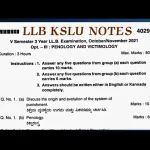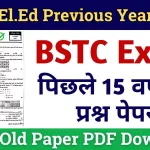KSLU Question Papers Guide
KSLU question papers are an essential resource for Karnataka State Law University students. They help in understanding the exam format, important topics, and marking schemes. This guide includes questions and answers for various subjects, covering key areas for thorough preparation.
Constitutional Law
Question What is the significance of the Preamble in the Indian Constitution?
Answer The Preamble reflects the objectives of the Constitution and serves as a guide to interpreting its provisions. It highlights justice, liberty, equality, and fraternity.
Question Explain the doctrine of separation of powers.
Answer This doctrine divides government functions into three branches—legislative, executive, and judiciary—ensuring no branch interferes with another’s functions.
Question What is judicial review?
Answer Judicial review is the power of courts to assess the validity of laws or executive actions against the Constitution.
Question Define fundamental rights and their importance.
Answer Fundamental rights are guaranteed by the Constitution to ensure individual freedoms and protect citizens from state excesses.
Question What is the difference between Article 14 and Article 15 of the Constitution?
Answer Article 14 ensures equality before the law, while Article 15 prohibits discrimination based on religion, race, caste, sex, or place of birth.
Question Explain the concept of writs under Article 32.
Answer Writs are legal instruments issued by courts to enforce fundamental rights, including habeas corpus, mandamus, prohibition, quo warranto, and certiorari.
Question What is the purpose of Directive Principles of State Policy?
Answer They guide the government in formulating policies to establish a just society, promoting economic and social welfare.
Question What is meant by the federal structure of the Indian Constitution?
Answer The Indian Constitution establishes a dual government system with clear division of powers between the center and states.
Question What is the importance of the 42nd Amendment?
Answer The 42nd Amendment emphasized socialism, secularism, and integrity in the Preamble and curtailed judicial review to strengthen parliamentary supremacy.
Question Explain the concept of emergency provisions.
Answer Emergency provisions empower the President to manage situations like war, external aggression, or internal disturbances, overriding normal governance.
Question What is the role of the Election Commission of India?
Answer The Election Commission oversees free and fair elections for Parliament, state legislatures, and the offices of President and Vice President.
Question Define the term “ordinance” and its scope.
Answer An ordinance is a temporary law issued by the President or Governor when the legislature is not in session.
Question What is the basic structure doctrine?
Answer The basic structure doctrine ensures that fundamental features of the Constitution cannot be amended by Parliament.
Question Differentiate between Lok Sabha and Rajya Sabha.
Answer Lok Sabha is the lower house of Parliament with directly elected members, while Rajya Sabha is the upper house with members elected by state legislatures.
Question What is meant by single citizenship in India?
Answer Single citizenship means all Indians are citizens of India, irrespective of the state or region they belong to.
Question Define public interest litigation (PIL).
Answer PIL allows individuals or groups to approach the court to address public grievances, even if they are not directly affected.
Question What are fundamental duties under the Indian Constitution?
Answer Fundamental duties are moral obligations for citizens to promote harmony, protect the environment, and uphold the Constitution.
Question What is the significance of Article 21?
Answer Article 21 guarantees the right to life and personal liberty, interpreted to include a dignified life, privacy, and health.
Question Explain the role of the President in legislative functions.
Answer The President summons sessions, gives assent to bills, and has the power to issue ordinances.
Contract Law
Question What constitutes a valid contract?
Answer A valid contract requires offer, acceptance, lawful consideration, competent parties, and a legal objective.
Question What is an offer in contract law?
Answer An offer is a proposal by one party to another indicating a willingness to enter into a contract.
Question Define consideration in a contract.
Answer Consideration refers to something of value exchanged between parties in a contract.
Question What is the doctrine of privity of contract?
Answer This doctrine states that only parties to a contract can sue or be sued under it.
Question What is meant by breach of contract?
Answer Breach occurs when a party fails to fulfill their obligations under the contract terms.
Question Define the concept of free consent.
Answer Free consent implies that parties agree to the contract without coercion, fraud, undue influence, or mistake.
Question Explain the term voidable contract.
Answer A voidable contract is valid but can be annulled by one party due to specific legal reasons.
Question What are the remedies for breach of contract?
Answer Remedies include damages, specific performance, rescission, or injunctions.
Question What is the difference between express and implied contracts?
Answer Express contracts are clearly stated, while implied contracts are inferred from actions or circumstances.
Question Define the term quasi-contract.
Answer Quasi-contracts are obligations imposed by law to prevent unjust enrichment, even without a formal agreement.
Question What is the difference between void and voidable contracts?
Answer Void contracts are unenforceable from inception, while voidable contracts remain valid until canceled by one party.
Question Explain the term performance of a contract.
Answer Performance refers to the fulfillment of contractual obligations as agreed by the parties.
Question What is an anticipatory breach of contract?
Answer An anticipatory breach occurs when one party indicates they will not perform their obligations before the due date.
Question Define specific performance in contract law.
Answer Specific performance is a legal remedy requiring a party to perform their contractual obligations.
Question What are contingent contracts?
Answer Contingent contracts depend on the occurrence of a specific event for their performance.
Question What is undue influence in contracts?
Answer Undue influence involves using a dominant position to pressure another party into a contract.
Question Explain the term capacity to contract.
Answer Capacity refers to the legal ability of parties to enter into a binding contract.
Question Define the term novation in contract law.
Answer Novation occurs when a new contract replaces an existing one with the agreement of all parties involved.
Question What is frustration of contract?
Answer Frustration occurs when unforeseen events make the performance of a contract impossible or illegal.
Conclusion
KSLU question papers are valuable for exam preparation, providing clarity on topics and formats. This comprehensive Q&A helps students grasp subjects like Constitutional and Contract Law effectively. Use these resources to strengthen understanding and excel in examinations.
Related Posts:
Latest Posts
- Step-by-step guide to download and apply for jee mains admit card 202
- Comprehensive 2025 government holidays and recruitment details for job seekers
- JEE Mains Admit Card 2025: Your Step-by-Step Guide to Downloading the Hall Ticket
- Everything You Need to Know About 2025 Government Holidays Recruitment
- Comprehensive Guide to rrb d group recruitment 2025 – Eligibility, Vacancies, and Application
- Detailed guide to nps trust recruitment 2025 vacancies, eligibility and apply process
- Comprehensive guide to hpcl recruitment 2025 notification, vacancies, and application process
- ignou bed admission 2025 complete recruitment guide with eligibility and process
- Comprehensive Guide to Indian Army Agniveer Recruitment 2025 Notification and Jobs
- Everything You Must Know About CBSE Board Exams 2025 Changes & New Rules






